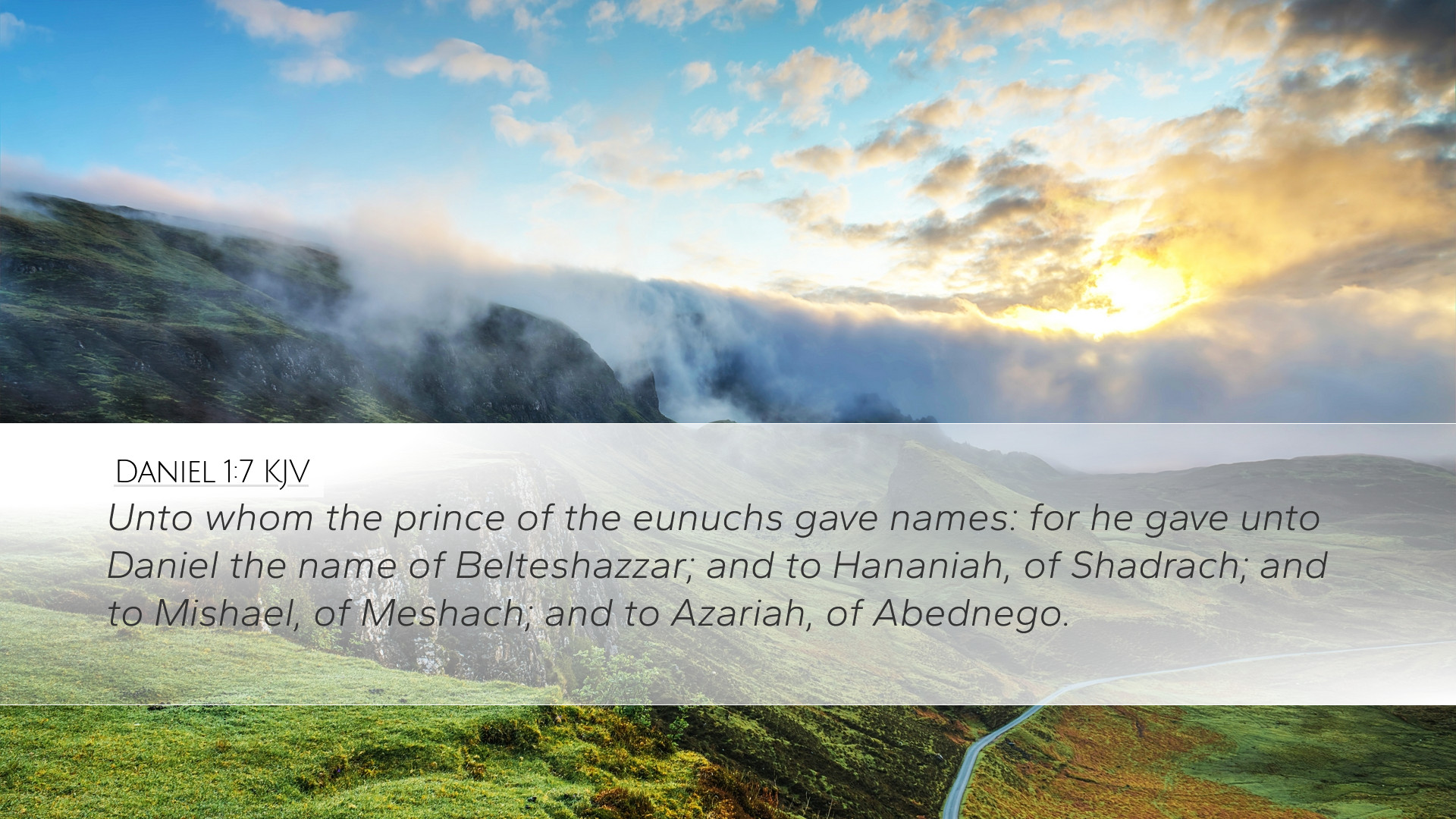Old Testament
Genesis Exodus Leviticus Numbers Deuteronomy Joshua Judges Ruth 1 Samuel 2 Samuel 1 Kings 2 Kings 1 Chronicles 2 Chronicles Ezra Nehemiah Esther Job Psalms Proverbs Ecclesiastes Song of Solomon Isaiah Jeremiah Lamentations Ezekiel Daniel Hosea Joel Amos Obadiah Jonah Micah Nahum Habakkuk Zephaniah Haggai Zechariah MalachiDaniel 1:7
Daniel 1:7 KJV
Unto whom the prince of the eunuchs gave names: for he gave unto Daniel the name of Belteshazzar; and to Hananiah, of Shadrach; and to Mishael, of Meshach; and to Azariah, of Abednego.
Daniel 1:7 Bible Commentary
Commentary on Daniel 1:7
Verse Context: Daniel 1:7 reads: “To them the chief of the eunuchs gave names: he gave Daniel the name Belteshazzar; to Hananiah, Shadrach; to Mishael, Meshach; and to Azariah, Abednego.” This passage marks a significant moment in the lives of Daniel and his companions, illustrating themes of identity, cultural assimilation, and divine providence.
Historical and Cultural Background
1. Babylonian Captivity: The context of this verse is set against the backdrop of the Babylonian exile, where Jewish youths were taken captive and educated in the ways of Babylon. This included a systematic effort to change their identities and loyalties.
2. Name Changes: The change of names from their Hebrew names to Babylonian ones signifies an attempt to obliterate their Jewish identity. Each new name bears associations with Babylonian deities, aiming to instill a sense of loyalty to Babylon rather than to Yahweh.
Theological Implications
1. Identity and Heritage: The renaming of Daniel and his companions highlights the struggle between maintaining one’s heritage amidst external pressures. Matthew Henry suggests that a name is more than a mere label; it reflects one’s character and purpose ordained by God.
2. Sovereignty of God: Despite the attempts to redefine these young men, the overarching theme is God's sovereignty. Albert Barnes articulates that while man may attempt to alter names, God retains authority over one’s identity and destiny. This implication reassures readers that God’s plans cannot be thwarted by human actions.
Character Analysis
1. Daniel: Known for his integrity, Daniel stands as a testament to firmness of faith. Adam Clarke points out that despite the Babylonian influence, Daniel remains committed to his beliefs. His name, meaning "God is my judge," reflects his unwavering allegiance to the true God despite being renamed.
2. Hananiah, Mishael, and Azariah: The companions of Daniel, given the names Shadrach, Meshach, and Abednego, also embody resilience. Their Hebrew names denote attributes of God’s mercy and help, which serve as a constant reminder of their covenant with the Lord. Clarke notes that each of these names served to promote the spiritual integrity of these men.
Practical Applications
1. Standing Firm in Faith: The reactions of Daniel and his friends serve as a model for believers facing cultural pressures. In a world that seeks to redefine values and identities, Christians are encouraged to remain steadfast in their faith, as these young men did.
2. Influence of Culture: The renaming can be viewed as a metaphor for the cultural influences that can sway believers today. This passage challenges pastors and leaders to develop strategies for teaching congregations how to navigate modern societal pressures without compromising their identities in Christ.
Conclusion
Daniel 1:7 vividly illustrates the tension between faithfulness to God and the allure of cultural assimilation. The enduring lesson from this scripture, complemented by insights from commentaries, emphasizes the importance of understanding one's identity as rooted in the divine rather than in societal constructs. As such, believers are called to embrace their identity in Christ while navigating the challenges presented by the world.


